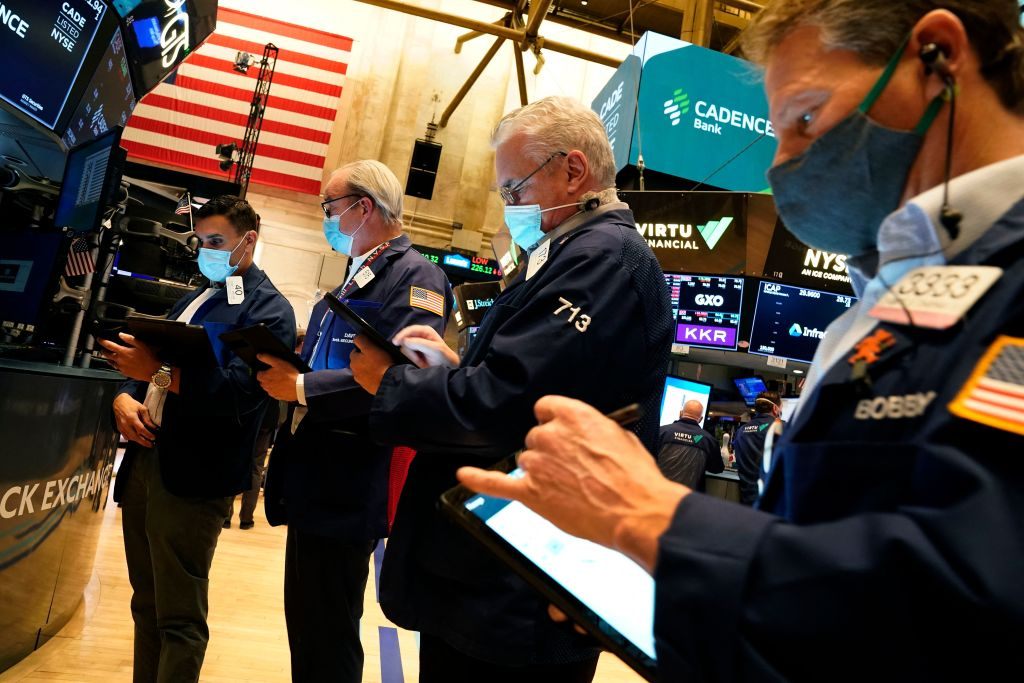VC Valuations
Stock market sell-off is already taking a toll on pre-IPO valuations
January 25, 2022
Traders on the floor of the New York Stock Exchange (Timothy A. Clary/Getty Images)
Normally, when shares of publicly traded companies go through a sharp decline, venture capitalists take their time before using those price swings to gauge comparable values in their private market dealings.
But investors have been antsy since earlier this month. The recent sell-off in the stock market has been so severe that it's already making an impact on late-stage funding rounds and the trading of secondary stakes.
"This feels very much like what happened at the beginning of the pandemic, where there was a shock to the system. And everyone said, 'I don't know what this shock really means, but let's slow down for a little bit,'" said Frank Rotman, co-founder and partner at QED Investors.
Rotman said the current "pause" is most acute in later-stage deals because those investments have a shorter time to liquidity.
He added that while there now may be less competition and fear of missing out on earlier-stage deals, the valuation "correction" may take some time to trickle down to younger startups.
Until several weeks ago, it wasn't uncommon for VC investors to value late-stage software startups at 50 times or more their annualized revenue. But Ravi Viswanathan, founder and managing partner at NewView Capital, a growth-stage firm that spun out of NEA in 2018, said he has seen a halt to multiples of that magnitude since the Nasdaq's tumble started a few weeks ago.
"There appears to be more flexibility on valuation as well as on [execution] timing," Viswanathan said. "We'll see if this is the new normal or a momentary blip."
Another SaaS-focused investor who asked to remain anonymous said that he saw some deals reprice or fall apart last week in reaction to the public market swoon.
The decline in tech stock prices has also dampened secondary market activity.
Many investors who planned to buy secondary stakes in unicorn-valuation companies have withdrawn their existing bids or hit pause mode on making new transactions, according to Greg Martin, managing director at Rainmaker Securities, a brokerage specializing in sales of pre-IPO companies.
"We are also starting to see new bids at discounted prices," Martin added. Companies whose prices dropped significantly include Impossible Foods, TikTok parent ByteDance and cryptocurrency platform Kraken, he said.
The secondary market has expanded over the last several years from trading shares in a select group of companies to hundreds of companies, as a larger number of investors have sought access to fast-growing technology companies with prospects of exiting through public offerings.
But the current stock market sell-off is throwing a wrench in that growth trend.
Martin predicted that secondary trading activity will continue to be slow until the stock market stabilizes or sellers reset their pricing expectations to lower levels.
While the stock market is now going through its worst streak since March 2020, some investors are optimistic stocks will recover because overall business and economic conditions remain on strong footing.
But most investors agree that valuations of tech companies should be priced at lower levels in a rising interest rate environment.
"Now that people understand that the Fed tightening is going to happen, valuation adjustment is happening in a very orderly fashion," Rotman said. "Much more orderly than people would think."
Related read: WeTransfer pulls IPO as tech stocks dip
Comments:
Thanks for commenting
Our team will review your remarks prior to publishing.
Please check back soon to see them live.